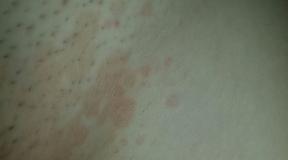The child has a poor appetite, the child has no appetite or has lost his appetite, why, reasons. What to do and how to increase your appetite. Reasons for poor appetite in a child A 7-year-old child has lost his appetite reasons
Loss of appetite in a child can be caused by a number of reasons - from age to serious illness. Before you begin to deal with this symptom, you need to find out why this condition arose. Based on this, treatment tactics are already determined. So what can you do to increase your baby's appetite?
Appetite and hunger: how do they arise?
In the medical field, appetite and hunger are different concepts. The latter is caused by the lack of food entering the body and is an unconditioned reflex. In the cerebral cortex and subcortical structures there are hunger centers, which are excited when the level of glucose and other elements necessary for the child’s body in the blood drops. When you are hungry, saliva begins to be produced, your sense of smell becomes more acute, and sucking and pulling sensations occur under the tongue and in the stomach area.
Appetite is rather a selective manifestation of the feeling of hunger. It arises as a result of preference for certain products, time of day, psychological state of the child, national and religious habits. Appetite disturbances can manifest themselves in several ways:
- General appetite decreases;
- Appetite changes;
- There is no appetite at all.
In the first case, the child may not want to eat anything at a certain period of time for various reasons. When appetite changes, taste requirements for a particular food are disrupted. If appetite is completely absent, then this can already be associated with a lack of hunger caused by illness or other unhealthy condition. This pathology is called anorexia. The norm is that a child refuses to eat no more than twice a day.
Loss of appetite occurs in a child for a number of reasons. Either this is selective nutrition, when there is an opportunity to have a snack between meals, and therefore the feeling of hunger does not fully develop, or any other reason that can be associated with an unhealthy lifestyle. If the factor is pathological, then the state of loss of appetite is caused either by intoxication or suppression of the hunger center due to hormonal imbalance. When intoxicated, all the body’s forces are spent on eliminating toxins and the causes that caused them. Blood flows from the brain to the affected tissue, which slows down the frequency of processes in the cortex and subcortex of the brain. If the pathology develops due to hormonal imbalance, then hormones or their absence directly affect the processes occurring in the brain, which eliminates the feeling of hunger.
Video: what is appetite
Reasons for absence
There are a number of reasons leading to loss of appetite. Conventionally, they can be divided into pathological and other. Pathological is usually understood as those conditions that are caused by malfunctions in the body due to the development of diseases or other similar factors. These include:
We can list for a long time the diseases and pathologies that lead to the loss of hunger in a child. Any deviation in the functioning of the body can cause this symptom. But also external or internal factors can affect the process of food consumption. These include:
Why might a child have no appetite? 13 reasons that not everyone will think about
- changes in climatic conditions: heat, rainy weather, and so on;
- recovery period after illness;
- change in the social component: the child’s environment, society, loss of a loved one, animal, and so on;
- lack of movement;
- inadequate, unhealthy diet;
- pain in the body, for example, caused by injury;
- lack of fresh air and sunlight;
- use of medications;
- having snacks between meals;
- overload.
It is noted that the most common non-pathological cause is lack of movement, which is directly associated with playing computer games. This is a dangerous addiction, in which not only social contacts are lost, but the body also changes on the physical plane. At the beginning of the development of computer addiction, cases of death were even recorded, as children simply refused to eat and sleep.
Important! Often the cause of decreased appetite is a lack of exercise, fresh air, vitamins and excessive exercise, especially when it comes to the educational process. Perhaps it is worth changing the child’s lifestyle a little and his condition will return to normal.
Absence rates
As mentioned earlier, a child is normally able to refuse food no more than twice a day. The rest is a deviation from the norm. But this condition can last up to five days, which is also not a deviation from generally accepted medical indicators. The disorder is manifested by the following symptoms:
- weight loss;
- taste preferences change;
- The amount of food the child consumes changes.
It is noted that these symptoms can normally occur regularly, but not more than once a month, lasting no more than five days. And at least once a day the baby should want to eat. Here it is especially important not to miss the moment when the child has a snack, which happens quite often if the family does not follow a normal diet with meals according to the time of day.
Features of absence
Appetite, as a state of hunger, manifests itself only under certain conditions, as mentioned earlier. In particular, a drop in glucose causes this feeling. If there is a deficiency of some substance in the body, then the child may develop food preferences until the body makes up for the deficiency. You need to start worrying about the lack of hunger only if the child begins:
- lose weight rapidly;
- experience associated symptoms;
- look not just tired, but weak and exhausted;
- show concern, anxiety, be capricious.
In such cases, it is necessary to find out the reason for the lack of hunger before the condition becomes critical and goes into the stage of anorexia, that is, a complete lack of appetite with all the ensuing consequences.
Associated symptoms
Loss of appetite may be accompanied by other symptoms:
- temperature;
- nausea;
- vomit;
- constipation or diarrhea (there may be mucus and blood, color or smell may change);
- lethargy;
- skin rashes;
- significant or rapid weight loss and so on.
These symptoms indicate obvious malfunctions in the body. Therefore, you should consult a doctor for a diagnosis that will show the cause. If any disease is not detected, then you should pay attention to the child’s lifestyle.
Selective appetite
A fairly common occurrence in every family with a child is food selectivity, in which the child gives preference to a specific group of foods. This is not related to the disease. There is only one reason for this: the emotional component. That is, at certain intervals in life, the child becomes an individual and tries to take over, even in this form, over his parents, indicating what and when he wants to eat and what he doesn’t.
 How to properly improve a child’s appetite?
How to properly improve a child’s appetite? Here you should do the only right thing: from the very beginning, show the baby that he is wrong. Using an example, not only show, but also tell that if the food is not eaten, then the next snack will happen only at the next meal. As a rule, several such repetitions reduce selectivity to nothing. If systematic education does not produce an effect, then perhaps this is not the reason for such a violation.
Poor appetite in a baby
Infancy is a time of rapid changes in physiology. Over the course of a year, a child changes and grows, his teeth erupt, body systems are formed, his own immunity and microflora of the body develop. Often all these processes are accompanied by loss of appetite for various reasons. It is difficult for a parent to determine the cause of lack of appetite in infants, and therefore it is necessary to contact a pediatrician. There may be several factors:
- incorrect feeding process (for example, feeding by the clock);
- disruption of the usual feeding process;
- eating sweets (mashed potatoes, etc.);
- changes in climatic conditions: weather changes, pressure changes;
- emotional stress (for example, fear);
- diseases of the oral cavity: candidiasis, stomatitis, and so on;
- diseases of the ENT organs: runny nose, ear pain, and so on;
- teething (in children from three months to three years, loss of appetite can recur regularly for this very reason);
- changes in diet (for example, switching to new foods, introducing complementary foods).
With the introduction of complementary foods, selectivity begins to appear. Just like adults, babies develop a preference for one food or another. You may get tired of monotonous food. Parents must “win” this factor not by imposing food, but by developing appetite, changing foods, methods of preparing or serving them.
Teething is solved by relieving symptoms that bother the child. In these cases, either drugs that reduce the sensitivity of the gums or special toys with filler that are pre-cooled help. But you should be as careful as possible, as the child may catch a cold.
Other reasons
Lack of appetite may not be sudden, but rather as a manifestation of the individual structure of the body, metabolism. If the child initially ate a certain amount of food and does not lead an active lifestyle, then you cannot feed him. This can lead to obesity. Quite often you can find that a child is quiet by nature, loves quiet games, and therefore spends less energy than his peers. Hence the slight appetite. In this case, it is also not recommended to force feed him.
Diseases quite often cause reluctance to eat. Therefore, the symptom itself is only a consequence, and it is necessary to fight the root cause. To do this, you should first consult a doctor, get diagnosed and begin proper treatment. It should be remembered that the wrong approach to solving the problem leads to pathological changes in the functioning of organ systems, as well as to the development of anorexia, which can lead not only to disability, but also to death.
What to do to increase and improve your child’s appetite
You can increase your child's appetite if the situation requires it. It should be understood that every person from birth is endowed with his own character, body characteristics, and metabolism. Therefore, forced saturation can give a completely opposite result. But if your appetite has suddenly disappeared, it can be restored in various ways - from original serving methods to medications.
What to do first
You should not immediately resort to the use of medications and folk remedies. There are a lot of techniques that allow you to restore the feeling of hunger in a healthy way. You can, for example, put your child on a special diet that will help increase appetite, set a clear example, for example, by eating with the whole family, and so on.
It is noted that at some ages a child is able to adopt the habits of adults. For example, if one of the family members is on a strict diet to lose weight, then the child may adopt this behavior.
Even the introduction of certain products can make a significant difference. To increase appetite, it is useful to eat foods such as:
- herbs, spices, seasonings;
- marinades, pickled vegetables, mushrooms and so on;
- sour foods - apples, kiwi, pineapples, plums, grapes, citrus fruits;
- dried fruits (dried apricots, prunes, raisins);
- compote, juices, but only fresh ones, not store-bought ones.
- canned food;
- pickles.
It is necessary to understand that such foods should be given before meals or during meals in strictly limited quantities so as not to reduce the feeling of hunger. Take a closer look, perhaps the portions are too large for a child, and therefore the child simply does not have time to get hungry before lunch after a hearty breakfast.
For any age, certain indicators of calorie needs are characteristic. Please note that these are only average figures, which may differ from reality in each specific case. Based on the average indicators, create your child’s diet from the products suggested above.
You can also offer your child interesting dishes. The Japanese have long solved the problem of lack of appetite in children with a combination of tradition and imagination. Here are examples of such dishes:
 A simple breakfast: wool from blackberries or mulberries, head and legs from fresh cheese, soil from nuts and dried fruits, and sun from ripe kiwi, pineapple or other yellow fruit
A simple breakfast: wool from blackberries or mulberries, head and legs from fresh cheese, soil from nuts and dried fruits, and sun from ripe kiwi, pineapple or other yellow fruit  A very simple breakfast to prepare: a mountain is made from a pancake, and the top is smeared with condensed milk or whipped cream. A sakura branch consists of flowers that are cut from strawberries and the branches themselves. The twig can be made edible by cooking it with chocolate
A very simple breakfast to prepare: a mountain is made from a pancake, and the top is smeared with condensed milk or whipped cream. A sakura branch consists of flowers that are cut from strawberries and the branches themselves. The twig can be made edible by cooking it with chocolate  Make a narwhal from a pancake, cover its horn with stripes of jam and whipped cream. Rainbow is made from fruits at your discretion
Make a narwhal from a pancake, cover its horn with stripes of jam and whipped cream. Rainbow is made from fruits at your discretion  boiled or steamed oatmeal, strawberries and blackberries or blueberries. animals can be varied. For example, to “make” a bear, use a plum
boiled or steamed oatmeal, strawberries and blackberries or blueberries. animals can be varied. For example, to “make” a bear, use a plum  For dessert you need various berries (grapes, cherries, cherries, cherry plums), white bread or crispbread, which are spread with various jams or preserves. Make the top with Nutella and the white parts with whipped cream.
For dessert you need various berries (grapes, cherries, cherries, cherry plums), white bread or crispbread, which are spread with various jams or preserves. Make the top with Nutella and the white parts with whipped cream.  Made from cereal breads, but you can replace them with pancakes, blueberries, pomegranate and pineapple pieces are also used, and whipped cream is used for the soil and flower stem
Made from cereal breads, but you can replace them with pancakes, blueberries, pomegranate and pineapple pieces are also used, and whipped cream is used for the soil and flower stem  “The Princess and the Pea”: three types of cheese for the feather bed and the princess’s head, black bread for the base bed, lettuce, pea pod, lettuce stems or parsley for the legs of the bed
“The Princess and the Pea”: three types of cheese for the feather bed and the princess’s head, black bread for the base bed, lettuce, pea pod, lettuce stems or parsley for the legs of the bed  Serving the “North Pole” dessert: pear for making a penguin, milk rice porridge, cherries for the “fish”, Raffaello sweets, blue plate
Serving the “North Pole” dessert: pear for making a penguin, milk rice porridge, cherries for the “fish”, Raffaello sweets, blue plate  Salad “Kotik”: lettuce, olives, chili tomatoes, lettuce, feta cheese
Salad “Kotik”: lettuce, olives, chili tomatoes, lettuce, feta cheese
Naturally, this technique can be applied to any children. A tasty dish prepared and presented in an interesting way can interest a child. You can also diversify your diet a little by introducing new foods. It often happens that a child does not eat certain vegetables or dishes. You can always find a lot of ways to prepare one ingredient in different ways, but not tell what is included in it. For example, a child does not like legumes, but there are analogues, for example, Japanese vermicelli funchose, which is prepared from them. Is your child tired of buckwheat or rice porridge? Change the side dish to potatoes or another type of cereal, such as corn porridge or millet.
Good to know: it is better to limit feeding time to 30 minutes maximum. If the child refuses to eat, then up to 10–15 minutes. Between meals, you can completely drown out the feeling of hunger with a small amount of nuts or dried fruits. They don't spoil your appetite.
Stimulants and drugs that improve appetite in children
If various educational and nutritional approaches do not help, then you can use medications and homeopathic preparations that enhance gastric motility, increasing appetite. Such drugs include:
- Vitamins A, C, group B. They can be found in vitamin complexes like Kavit Junior, Elkar, Vitrum Kids, Pikovit, fish oil. They are sold in the form of syrups, capsules, tablets, and solutions.
- Herbal teas such as mint, fennel or chamomile. Green teas are especially good.
- Peritol is a serotonin antagonist, which often blocks the feeling of hunger in a child. Peritol can suppress serotonin and increase appetite.
- Insulin can increase the feeling of hunger.
- Anabolic steroids make you feel hungry. Primobolan is considered the best of this series.
- Peptides. These drugs affect glucose metabolism and help induce appetite.
- Elixir Pernexin. Consists of liver extract, ferrous gluconate, thiamine, riboflavin, niacin, and other B vitamins. This is a homeopathic medicine.
- Iron supplements. They are recommended to increase appetite. Ferrum lek, Fenyuls, Sorbifer and so on are often prescribed. But sometimes such drugs can cause a feeling of nausea and, accordingly, give the opposite effect - loss of appetite and. Therefore, it is better to give preference to injections rather than tablet form.
- Creon is an enzyme preparation that enhances gastrointestinal motility. This increases your appetite.
- Apilak is a homeopathic dietary supplement based on royal jelly. Sold in tablet form. Helps to gently restore the child’s appetite due to the beneficial substances contained in the product. It is a biogenic stimulant with a general strengthening effect. If a breastfeeding mother drinks, lactation increases, and the beneficial substances of the drug are transmitted through breast milk.
- Holosas is a homeopathic medicine based on rosehip extract. This is a hepatoprotective and choleretic agent that can positively influence appetite.
Remember that the use of any drug in a child requires prior consultation with a doctor, even if it is a homeopathic dietary supplement. It is necessary to find out the reason for the child’s lack of appetite in order to relieve the symptom completely, and not while taking the medicine.
Chewing gymnastics
A very interesting and effective method of increasing appetite. It is performed quite simply and quickly, and the results come after the first lessons. Consists of five stages:
- Warming the tummy. To do this, stroke the indicated area 10 times clockwise.
- Clicking teeth. Open and close your mouth 24 times.
- Sipping. Clasp your hands above your head and stretch upward.
- We stroke with our tongue. The palate is massaged with the tongue, first clockwise and then counterclockwise once, and then saliva is swallowed.
- Smells. Sit down at the table and smell the food.
The first four stages are done in a standing position. Moreover, the best place for their implementation will be the kitchen, or where there is already prepared food on a set table.
Folk remedies
Traditional medicine suggests coping with a child’s lack of appetite with bitterness. They are a good help in eliminating this symptom. The category of such plants includes those herbs that have an irritating effect on the gastric mucosa, which will cause the body to reflexively increase appetite. Such recipes are relatively safe, but still have their contraindications, for example, long-term use or hypersensitivity to the components. The following recipes are offered for consideration:
- “Appetizing” collection. You can buy it at the pharmacy. Consists of wormwood and yarrow in a consistency of 8:2. Take it three times a day half an hour before meals. Add one tablespoon of the mixture to a glass of water.
- Calamus root. Pour the crushed dry ingredient in the amount of one tablespoon into a glass of boiling water and leave for half an hour. Drink one quarter glass half an hour before meals.
- Wormwood. Can be purchased at the pharmacy as a tincture or as an herb. The tincture is more convenient to take. It is enough to take 15 drops before meals for 20 days. After 10 days you can repeat the course again. Brew the herb in the usual way: add a spoonful of herb to a glass of water and leave for half an hour. Take before meals.
These folk recipes will help solve the problem of lost appetite, but will not eliminate the root cause if the symptom is caused by any disease.
Treatment prognosis and possible complications
If treatment is started on time, the symptom can not only be relieved, but also the disease that caused it can be overcome. Lack of treatment leads to a number of negative consequences:
- Cachexia (rapid weight loss);
- Anorexia (complete loss of appetite);
- Loss of skin integrity (lack of vitamins and other useful and necessary substances);
- Decreased immunity;
- Impaired mental activity;
- Disruption of the internal organ systems.
The consequences of such complications can be both disability and death if qualified treatment is not provided. When providing assistance, even in advanced stages, it is possible to restore health, but not always in full and after a long period of time.
Prevention
The following parental actions can serve as preventive measures:
- Timely contact a doctor if there is a suspicion that the child is sick.
- Proper upbringing: supporting family traditions and habits regarding nutrition, rest, and so on;
- Carry out proper physical education, allow the child to expend his energy in the fresh air. Family walks and gymnastics will be useful.
- Proper psychological education. It is necessary to lead by example.
- Make the eating process not only familiar, but also interesting: new dishes, serving methods.
- Proper nutrition. A child will not eat properly if this is not accepted in the family.
- Regularity. You should get used to eating at the same time.
- Reduce emotional, physical, mental stress, help the baby adapt to society.
Following these simple rules will help your child maintain a healthy appetite.
Most often because many parents struggle to make sure they eat well. These problems do not occur in puppies or children in countries where the mothers have no idea about diet and are not overly concerned about it. Some babies are born with literally a voracious appetite, which does not diminish at all, even if they are in a bad mood or are sick.
Others have a more moderate appetite, and it is more influenced by health and mood. Almost all children, without exception, are born with an appetite sufficient to maintain health and age-appropriate weight gain.
The problem is that children are born with an instinctive stubbornness in their blood, which makes them resist if they are forced to do something, and lose interest in the food with which they have unpleasant memories. There is another difficulty: the child’s appetite changes literally by the minute. Today, for example, he may like melon or some new porridge for breakfast, but a few weeks later he will turn away from the same food with disgust.
If you wish, you can see for yourself that nutritional problems can arise at various stages of a child’s development. Some babies are stubborn in the first months of life, when parents are constantly trying to force them to drink more milk than they need, others - during the first attempts to feed solid food, when they are not given the opportunity to gradually get used to it or are forced to eat when they are not in the mood . Many people become more capricious and picky at one and a half years old, when they no longer need to gain weight so quickly, and sometimes because they are cutting teeth. If parents continue to insist, this further discourages the child’s appetite, and the problem becomes chronic. It is very common for a child to eat poorly when recovering from an illness: If concerned parents start pushing food into him before his appetite has returned, he may develop a persistent aversion to food.
Not all nutrition-related problems begin with parental insistence. A child may not eat well simply because he is jealous of his newborn brother, or for some other reason. But whatever the initial reason, parental concern usually only aggravates the problem and prevents the normalization of appetite.
Parents have feelings too
If a child has constant problems with food, this cannot but worry parents. They begin to worry that the baby may develop a deficiency of nutrients in the body, that his immunity will be weakened. No matter how the doctor tries to convince parents that children with poor appetite are no more susceptible to disease than others, it is difficult to make them believe this (and in fact, if nutrition problems are protracted, then the immune system weakens). Usually the father and mother feel guilty, imagining that relatives, neighbors and the doctor consider them bad parents, unable to look after the child. Most likely, this is not the case, and loved ones understand the situation perfectly, because in their families, probably at least one of the children also had problems with appetite.
In addition, parents often become angry with this stubborn person who completely ignores all their efforts. This is an extremely unpleasant feeling, because as a result, adults become ashamed of themselves.
Strong concern, feelings of guilt, irritation - all these are echoes of feelings laid down in childhood.
A child's poor appetite is not dangerous
Phenomena such as nutritional exhaustion, vitamin deficiency or infectious disease caused by malnutrition are extremely rare. Of course, if your child is not eating well, this should be discussed with your doctor during regular checkups. Your doctor's support will help you relieve the stress and worries associated with your child's poor appetite, and taking a daily multivitamin will give you confidence that your child is getting all the vitamins and minerals he needs.
What to do if your child has poor appetite?
Make feeding time enjoyable for baby
In conversations with your child, try not to comment on his appetite in any way - neither from the bad nor from the good side. Don't praise him for eating more than usual, and don't show concern if he hasn't eaten well. Over time, you will learn to just not think about it. When the child understands that no one is putting pressure on him, he will begin to listen to his own appetite.
You can often hear advice: “Put a plate of food in front of the child and remove it after half an hour. And don’t give anything until the next feeding.” Indeed, if a child is very hungry, he will eat. Thus, this technique can work, but only if the parents do not show irritability and do not turn it into punishment, that is, they remain friendly and calm. However, some parents follow this advice this way: they throw the plate on the table in front of the child and say in a threatening tone: “If you don’t eat in thirty minutes, I’ll take everything away and you won’t get anything until dinner.” And then they stand over their souls and wait. Such threats awaken the spirit of contradictions in the child and completely discourage appetite.
After all, it is important for you that the child starts eating not because he was defeated in the fight, but because he himself wanted to. Offer him his favorite dish first, so that at the mere sight of food his mouth waters and he can’t wait to sit down at the table. For 2-3 months, feed him nutritious, healthy foods that he loves, and eliminate those foods that he absolutely refuses.
If your child only dislikes one particular type of food, but eats everything else fairly well, you can replace it with fruits or vegetables, for example, until your child's tastes change.
Listen to your child's wishes
Sometimes you hear from parents: “If a child doesn’t like one thing, that’s not a problem. But my handsome man eats only peanut butter, bananas, oranges and drinks sweet soda. From time to time you manage to stuff a slice of white bread and a couple of teaspoons of green peas into it. And he doesn’t even touch everything else.”
This is indeed a more complex case, but the principle remains the same. Give your child a sliced banana and a piece of bread for breakfast, some peanut butter, 2 teaspoons of peas and an orange for lunch, and a slice of bread and another banana for dinner. If your child asks, give him more. Just in case, don't forget to give him a multivitamin. For several days in a row, offer him such food in different combinations, with the exception of sweet carbonated drinks and other inferior foods, since sweet syrup can completely kill his appetite.
If after a couple of months the child begins to look forward to lunch, add a couple of teaspoons (no more) of another food that he has tried, but not the one he hates the most. Don’t say a word about new food and don’t comment in any way on whether he will eat it or refuse it. After a couple of weeks, offer the same food again, and in between feedings, give him something else to snack on. The rate at which new dishes are added will depend on how much the appetite improves and how the child perceives the new food offered to him.
Don't show your interest in some foods over others. If the child likes it that way, then let him eat 4 servings of one dish and not touch the other (if it is, of course, healthy and nutritious food). If he doesn't feel like eating the main course but wants something sweet, serve him dessert with an indifferent look. Comments like “You won’t get dessert until you eat your vegetables” further discourage him from eating vegetables or soup and increase his cravings for sweets. The result is exactly the opposite. The solution is, with the exception of fruit, not to put any dessert on the table more than once or twice a week.
This does not mean that from now on the child will only eat what he likes. But if he already has problems with appetite and is suspicious of certain types of food, then the best way to get him to return to a normal, balanced diet is to pay as little attention as possible to what he eats.
Offer your child less than he can eat
When your child is not eating well, offer him small portions. Placing a pile of food on a plate will serve as a reminder to your child how much he will have to leave, which will further discourage his appetite.
If the portion is smaller than the child usually eats, then the thought comes to his mind: “This is not enough for me.” He should form such an opinion. Let him think of food as something desirable. If he really has no appetite, then the portions should be simply miniature: a teaspoon of peas, a teaspoon of vegetables, a teaspoon of rice or potatoes. When the child finishes eating, do not ask him with a worried look: “Should I add more?” Let him ask for more, even if it takes several days for such a thought to mature in him. It's better to put a small portion on a saucer.
Is it necessary for parents to be present during meals?
The answer to this question depends on the child’s habits and desires and on how skillfully parents can hide the external manifestations of their anxiety. If before this they always sat next to him, then their departure will upset the child. Provided that the parents are friendly and calm towards the child and the way he eats, it is better to sit with him at the table. If parents are unable to control their emotions and constantly feel the desire to force the child to eat, then it is better to leave the stage for this time, and not demonstratively, but tactfully and gradually, increasing the time of their absence by several minutes a day so that he does not notice difference.
No ultimatums, bribery or threats
Parents should not use these methods to get their child to eat. Bribery includes a fairy tale told for each spoonful eaten and a promise to do a headstand if the child finishes the spinach. Although this method of persuasion may at some point force the child to eat a little more, in the long term this will only lead to a decrease in appetite. Parents will have to constantly increase the stakes to achieve the same result, and eventually they will have to perform an entire vaudeville act for the sake of five spoons.
Don't ask your child to finish lunch to earn dessert or some other prize. Don’t ask him to eat a spoon, for mom and dad, so that he grows up big and strong, so that he doesn’t get sick, or just so that he leaves behind a clean plate. To force children to eat, they should not be threatened with physical punishment or deprivation of some pleasures.
Let me remind you once again of the basic rule: do not beg, do not promise and do not insist. There is nothing wrong with a father or mother telling their child a story at dinner or playing music, if that is the tradition in the family. But this should not have anything to do with how much and how the child eats.
Causes of loss of appetite There may be physiological conditions associated with age or changes in habits, changes in season or the conditions of a person’s stay, but it can also be a manifestation of pathological conditions, in which case loss of appetite may be a symptom of a “banal” flu or an indicator of something more serious.
Finally, one of the main reasons for lack of appetite- psychological disorders such as stress or anxiety.
What causes lack of appetite
Loss of appetite is an eating disorder that is characterized by a sharp decrease in hunger, and is often accompanied by a feeling of food aversions.
This condition can appear suddenly when associated with pathological or emotional factors, but can sometimes be chronic and lead to more serious eating disorders.
Loss of appetite affects all categories of people: youth, children, elderly and adults, and can occur at any time in life.
Chronic loss of appetite - risks and consequences
Lack of appetite for a limited period should not cause any particular problems. But if appetite does not return and the lack of appetite becomes chronic, very serious health risks can arise.

Among the consequences of prolonged lack of appetite we have:
- Nutritional deficiencies: Eating little or not eating for a long period leads to deficiency micronutrients, such as vitamins and minerals, and macronutrients, such as proteins, carbohydrates and lipids. This leads to a state of discomfort, fatigue and the appearance of diseases such as iron deficiency anemia.
- Dehydration: Lack of appetite is usually accompanied by a decrease in water intake, which leads to dehydration. This is one of the main risks of lack of appetite in children and the elderly.
- Excessive weight loss: Long-term lack of appetite can lead to the consumption of fatty tissue in the body, which leads to excessive thinness. Losing weight can lead to serious complications because it weakens the entire body, including the immune system.
- Formation of ketone bodies: if sugars are not supplied from food for more than 24-48 hours, then ketone bodies are formed in the body, substances that the body needs to obtain energy from fatty acids, but at the same time they are toxic to the body. This phenomenon often occurs in children with high fever.
- The emergence of eating disorders: If refusal to eat becomes chronic, the lack of appetite can develop into anorexia - a very severe eating disorder that can lead to death.
Causes of loss of appetite
Loss of appetite can have several causes, depending on the age and the specific person, but the following reasons can be distinguished:
- Physiological reasons: associated with specific periods, such as the change of season, the teething period of babies, or a period of particular physical fatigue.
- Psychosomatic reasons: Associated with periods of extreme stress, extreme anxiety, or mental fatigue.
- Pathological causes: May be a transient condition such as a cold or flu, a chronic gastrointestinal disorder, or a metabolic problem. Particular attention should be paid to lack of appetite in both children and adults when it is accompanied by photosensitivity, since this condition can be the onset of meningitis (a fatal disease if not treated promptly).
- Psychiatric causes: Associated with eating disorders such as bulimia or anorexia.
- Genetic causes: There appears to be a genetic link that leads to lack of appetite in children whose parents had appetite problems as children.
It is clear that loss of appetite is a multifactorial and very complex problem, and the causes vary significantly from person to person.
Lack of appetite in children and adolescents
Loss of appetite in a child can occur during all periods of his growth (from childhood to adolescence), and is caused by factors that differ depending on age.

Reasons lack of appetite in children, as a rule, are pathological and psychological in nature or are simply associated with a certain moment of growth.
Pathological causes: diseases, infections and influenza
Various diseases are common causes lack of appetite in children. Loss of appetite can be either a consequence of the disorder itself or a side effect of medications taken.
Loss of appetite may also be associated with physical changes that occur during childhood and adolescence.
Let's see what factors influence appetite depending on age groups:
- Babies and children: In infants, infants and children under one year old, lack of appetite can be associated with two main factors: teething and weaning.
- Teething begins around the 5th month of life and lasts until 9-11 months, then to be fully formed around the 2nd year of life. During this period, the child often experiences loss of appetite.
- Weaning carried out, as a rule, in the sixth month. At this point, the child may lose his appetite, as the child must get used to the change in taste. In addition, during the weaning period, there is a slowdown in growth rates, which is associated with physiological changes in the gastrointestinal tract, which must get used to the new food, and this can cause a lack of appetite.
- Children aged 18 to 24 months: from the 18th month and 2 years of life, a number of physiological changes occur in the child’s body, leading to a decrease in appetite. This happens because until 2 years of age the growth rate is very high, and after 24 months the rate slows down, and at the same time the need for food decreases.
- From 3 to 5 years: During this period, loss of appetite may occur due to simple "tantrums" when introducing new foods into the child's diet or changing certain habits, such as starting kindergarten or having a younger brother.
- Youth: Hormonal changes that occur during adolescence often cause loss of appetite during this period. This special period should be kept under control because loss of appetite occurs very suddenly and becomes chronic, leading to the emergence of eating disorders such as anorexia, especially among female adolescents.
Psychological reasons: social and family
Lack of appetite in a child or teenager may be a symptom of psychological or social difficulties.
Among the most common causes related to the psyche we have:
- School: Starting to attend kindergarten and then school is an alarming situation for children and adolescents, which often leads to loss of appetite and a feeling of heaviness in the stomach.
- Friends: in addition to studying, the child is forced to reckon with his peers. Relationships with peers are not always idyllic, groups may form from which the child remains excluded, or bullying may occur among adolescents. All this causes severe psychological discomfort, which is also manifested by loss of appetite or interest in food.
- Family: Parents who constantly quarrel, disharmony in the family or the appearance of a younger brother are emotional stresses for the child, who may react by losing appetite. Refusal to eat in this case is intended to attract the attention of loved ones to oneself.
Non-pathological reasons - change of season and vaccinations
Loss of appetite in children can be caused by reasons that are not necessarily pathological or psychological in nature.
For example:
- Season change: The transition from the cold season to spring and then to summer may cause children to lose their appetite. In spring, loss of appetite is associated with a change in the length of daylight hours, and in summer, mainly with a decrease in hunger due to the heat.
- Vaccines: In the first years of life, children are given quite a few vaccines against various diseases. All of these vaccines have minor side effects that occur after administration, one of which is loss of appetite.
Lack of appetite in adults
Phenomenon lack of appetite in adults a little more complicated because it can be related to many factors that sometimes act in synergy with each other.
In adults there may be reasons external, that is, the influence of the environment in which a person lives and works, or internal, which are divided into natural, pathological and organic. For this reason, a correct determination of the cause of lack of appetite can only be made based on the prevailing symptoms.
So, let's look at the most common reasons that lead to lack of appetite in adults.
Psychological causes: stress, anxiety and depression
Psychological lack of appetite is related to individual problems of the person or relationships with others and the environment.
Various psychological factors determine lack of appetite, including:
- Love: during the period of falling in love, we are “fed” by the love we feel for our partner: all other pleasures fade into the background! Also, sadness and pain that stem from love are one of the most common reasons for lack of appetite.
- Anxiety and stress: Anxiety and stress often cause lack of appetite. Also, excessive fatigue, especially after a stressful or tiring day, represents a real stress on the body, which may require rest to such an extent that we do not even feel the urge to hunger.
- Depression: Those with depression may also suffer from loss of appetite. A depressed state often manifests itself as indifference to all surrounding objects, including food. If left untreated, loss of appetite due to depression can develop into anorexia.
- Eating disorders: One of the causes of loss of appetite is anorexia - an eating disorder that causes a decrease in appetite until it completely disappears. In this case, the lack of appetite becomes chronic and can lead to death.
- Environment: The work or family environment can lead to loss of appetite if not tailored to the individual's needs and expectations. Excessive tension can develop into physical discomfort, which is manifested by a lack of hunger.
Pathological causes
Most diseases, from the mildest to the most severe, cause a lack of appetite. The connection between lack of appetite and disease is due to the state of stress and loss of strength in which the patient’s body is.
Among the diseases in which there is a lack of appetite, we have:
- Intestinal and stomach disorders: abdominal pain, abdominal cramps, frequent diarrhea or, conversely, constipation, irritable bowel syndrome, slow digestion, often accompanied by nausea and lack of appetite. Even those who suffer from gastroesophageal reflux, peptic ulcers, gastritis, heartburn and nausea often have a lack of appetite.
- Thyroid problems: Those who suffer from hypothyroidism rarely feel hungry, as this pathology leads to a slower metabolism, which can lead to a decrease in appetite.
- Infections: any type of infection (in the oral cavity, genitourinary system, teeth) causes a general state of malaise, which can also be characterized by a lack of appetite. Infections in the mouth, such as mononucleosis or colds with sore throat, or dental infections due to tooth decay, cause loss of appetite.
- Oncology: All tumors (of organs and blood), such as leukemia or lymphoma, present a lot of stress, both physical and psychological. Loss of appetite may be a consequence of these conditions, as well as the medical care provided.
- Kidney or liver failure: Those who suffer from kidney or liver diseases have loss of appetite due to the fact that these organs are unable to clear the blood of metabolic waste products that accumulate in the blood and cause the onset of general malaise.
Non-pathological causes of loss of appetite
There are many non-pathological causes of lack of appetite; they are associated with various factors, such as:
- Vaccines: As in the case of children, vaccinations in adulthood have as a side effect a short-term loss of appetite, which disappears within a few days.
- Pregnancy: During the onset of pregnancy, especially in the first trimester, there may be a lack of appetite due to the nausea and vomiting that characterizes the onset of pregnancy.
- Season change: the arrival of spring and summer, lengthening daylight hours and rising temperatures significantly affect our body, which is manifested by symptoms such as lack of appetite, fatigue and drowsiness.
- Sleep disorders: Those who suffer from insomnia may suffer from a lack of appetite, especially in the morning, because insomnia impairs the body's regulation of the body's sleep-wake rhythm.
- Eating habits: Poor eating habits, such as skipping breakfast because you're not hungry in the morning or skipping lunch because you don't have time, can cause a lack of appetite.
- Drugs and treatments: Some medications such as antibiotics may cause loss of appetite. Lack of appetite during chemotherapy and radiation therapy is common.
- Postoperative period: After surgery, a condition characterized by a lack of appetite is often observed. This is especially common in people who have undergone surgery on the gastrointestinal tract or after tonsil removal.
Lack of appetite in older people
Loss of appetite in old age is a very common phenomenon. Lack of appetite in older people, in fact, is associated with age, which leads to a slowdown in basal metabolism, a decrease in energy requirements due to low physical activity and, accordingly, a decrease in hunger.
Decreased appetite in older people may be due to:
- Digestive problems: With age, there may be a decrease in the efficiency of digestive processes caused by a decrease in metabolic activity and a high incidence of constipation.
- The beginning of numerous diseases: Kidney failure, liver failure, tumors and infections often occur with age.
- Dental problems: Dental alignment in older people often causes problems with chewing and lack of appetite, and recurring dental infections are also a problem.
- Senile depression: loneliness, illness, lack of autonomy, makes older people susceptible to depression, which can manifest as decreased appetite and a general state of apathy.
How to stimulate appetite
As for adults, the first step is to identify the reasons that caused the lack of appetite and then apply appropriate treatment.
The situation is different for children and older people, whose loss of appetite is often an age-related disease. For this reason, instead of treatment, it may be more appropriate to follow some tips to cope with lack of appetite.
How to restore appetite in children
The first natural reaction of parents to a child’s loss of appetite is to force them to eat, which only aggravates the problem.
How to react to the situation, and what to do to cope with a child’s lack of appetite?
Let's look at some useful tips:
- Do not force your child to eat, because by doing so you may associate eating with a negative image.
- Always make sure there are no pathologies.
- Make sure your child eats at the same time and eats adequate portions (not too big, but not too small).
- If the lack of appetite is associated with a fever, provide cool (but not cold) drinks and foods.
- Use visual stimulation: Pretty food, bright colors, and presented in an exciting way can pique your child's curiosity and appetite.
As you can see, in older people, loss of appetite is closely related to age and a health problem. Therefore, to avoid malnutrition on the part of an elderly person, it is necessary to follow some recommendations.
Here are some of them:
- Make a diet, which will satisfy all the needs of an elderly person and which includes products that stimulate intestinal motility (constipation is one of the most common problems in old age). The products used should be easily digestible even by those who have problems chewing food.
- Make it so elderly man eating in company, carry on a conversation while eating. It is useful to invite someone you know, an elderly person.
- Prepare delicious foods, both in appearance and taste, perhaps with the addition of spices, since older people have a weakened sense of taste.
The diet of older people should contain all the nutrients necessary for the body's needs, should be low in fat and rely mainly on the consumption of lean meat and fish (at least 3 times a week).
Walking with my eldest son, I constantly heard: “What a well-fed boy!” These words filled me with a sense of parental pride - “I am a good mother and I feed my child wonderfully.” With my youngest son it was the other way around. His appearance in public was accompanied by statements: “He’s so skinny, why don’t you feed him at all?!” I feed him, and how, but he doesn’t eat anything! Closer to two years, the desire to feed a starving child at any cost turned into a manic idea. I went to the doctors and found out that there are eight reasons for the absence or decrease in appetite in children. And there are just as many ways to solve this problem
Reason #1:
The child is sick
Diagnostics:
Appetite disappears suddenly. In most cases, its absence is accompanied by symptoms of various diseases (fever, upset stomach, chills, headache, itching, skin rashes).
What to do:
Decreased appetite is one of the symptoms of many acute infectious diseases. The so-called defense mechanism is triggered. The body begins to spend energy on fighting the infection rather than on digesting food. Don't force your child to eat. Force-feeding during this period significantly increases the duration of the disease and can lead to stomach upset. As you recover, your appetite will return on its own. This is one of the first signals that the disease is receding. Offer your baby light foods. If there are no symptoms of acute infectious diseases, take a stool test. Intestinal diseases (dysbacteriosis, enterobiasis, helminths) can lead to lack of appetite.
Reason #2:
Fear of new foods
Diagnostics:
The child is conservative in food, he prefers products that are known to him, and categorically refuses any innovations. As a result, his diet is very meager and monotonous.
What to do:
If your baby refuses new types of food, do not rush him. But after some time, offer this product again. So, gradually getting used to the appearance and smell of the new food, the child will dare to try it. Set an example for your child to consume new products. Voice your feelings about the new food: “What a delicious fish, so soft and boneless.” Eventually curiosity will take over. If a child, having tried a small piece, categorically refuses to eat this product further, do not insist. A child’s addiction to the same foods often reflects the real needs of the child’s body. For example, many children under 2 years old categorically refuse vegetable dishes, preferring dairy products to them - this is explained by the body’s increased need for calcium, which is needed for the growth of bones and teeth and which is most abundant in dairy products. And at 5-6 years old, some children, on the contrary, do not eat dairy products, preferring vegetable dishes, which contain many vitamins necessary at this age.
Reason #3:
Unbalanced diet
Diagnostics:
The child practically does not eat at the table. But between meals he constantly takes bites. As a result, by the next meal he doesn’t want to eat again.
What to do:
Cancel the biting. Sweets, crackers and chocolates between meals provide the child with a sufficient supply of calories and reduce the need for food. Try to feed your baby on a schedule. The only way to “stuff” healthy foods into a child is to let him get hungry. The feeling of hunger (appetite) is the body’s readiness to accept food. According to experts, the body “remembers” the feeding regimen and, if it is observed, begins to prepare in advance for the digestion and assimilation of food. After only 7-8 days of regular feeding (with the abolition of snacks), the little eater’s appetite will appear like clockwork. In addition, with an unbalanced diet, the child’s body experiences a deficiency of vitamins, due to which there is no desire to eat (B vitamins especially affect appetite). To stimulate appetite, many nutritionists recommend giving your child multivitamins an hour before meals (after consulting with your doctor).
Reason #4:
Too many emotions
Diagnostics:
The disappearance of appetite coincides with some significant events - going to school (kindergarten), moving, family dramas (or, conversely, great joys).
What to do:
When a child is nervous, the desire goes away - the child does not want to sleep, walk, play, or even eat. First of all, it is necessary to find out exactly what event became a serious shock for the baby and led to a lack of appetite. Talk to your child, don’t brush off his problems, find out what worries him. Sometimes a child just needs to talk it out to relieve nervous tension. Do not force him to eat at any cost - in the absence of appetite due to nervousness, force feeding can cause a gag reflex. It is better to offer your child warm, soothing tea (with valerian, St. John's wort, chamomile) with honey. After a heart-to-heart conversation over a cup of tea, an appetite often appears. If you cannot solve the problem on your own, you need to contact a child psychologist.
Reason #5:
Physiological interference
Diagnostics:
The child wants to eat and begins the process with appetite, but almost immediately begins to be capricious and refuses food.
What to do:
Identify the physiological interference and eliminate it as quickly as possible. If a child is breastfed, the physiological features of the structure of the mother's breast (flat or inverted nipple, tight breast) may prevent him from getting enough. Lack of appetite can be caused by problems in the oral cavity, in which sucking, swallowing and chewing cause painful sensations (thrush, short sublingual frenulum, inflammation of the gums, toothache, inflammatory processes in the pharynx), disruption of the intestines (increased gas formation, tendency to constipation ). Very often it is difficult for a child to eat due to a stuffy nose.
Reason #6:
Low energy consumption
Diagnostics:
The child moves little and practically never spends time in the fresh air. In his free time, he prefers to read books, watch TV or play quiet games.
What to do:
The amount of food is directly proportional to the amount of energy expended. This is a kind of biological “insurance” against obesity. If, with a sedentary lifestyle, a child eats both cheeks, a good appetite can result in serious problems. Therefore, when energy expenditure decreases, appetite decreases on its own. The more the baby moves in the fresh air and spends more energy, the more willingly he eats. Therefore, in order to increase energy expenditure, it is necessary to change your lifestyle and way of rest. The ratio of intellectual and physical activity should be one to one. After an hour spent in a chair with a book, an hour of walking. Regardless of age, a child should spend at least 3 hours outdoors every day.
Reason #7:
Out of season
Diagnostics:
The desire to eat is not constant. It fluctuates depending on the time of year or time of day. For example, a child eats well in the summer (morning) and eats very little in the winter (evening).
What to do:
Each person has so-called individual biorhythms that determine the desire to eat, sleep, and walk. This is what explains the fluctuation of various desires depending on the time of day and time of year. In some they are practically invisible, while in others, on the contrary, they are pronounced. For example, typical “larks”, as a rule, eat a lot in the morning, while “night owls”, on the contrary, have an appetite in the late afternoon. When creating a daily routine for your baby, take into account the individual characteristics of the child’s body and do not try to bring your child closer to the book standard. In addition, children grow differently at different times of the year, and their appetite changes accordingly. For example, most babies grow actively in the summer, but in winter the process slows down; accordingly, the desire to eat in the warm (not hot) season is much greater than in winter.
Reason #8:
Individual characteristics
metabolism
Diagnostics:
The child is developing normally and gaining weight well. He eats with pleasure, but very little, in your opinion. He gets full quickly, never asks for more and rarely asks to eat between meals.
What to do:
Do not try by any means to “push” more food into the baby. Analyze your appetite, husband and immediate family. Most likely, you will definitely have several more “little ones” in your family.
By showing a certain amount of imagination, parents will be able to feed even the most stubborn “unwanted” person to their fill.
- Creative approach. The food is not only tasty, but also beautiful. Children are much more interested in eating “mushrooms”, “faces” and “little animals”, rather than ordinary sandwiches and pasta.
- Dishes. A good assistant in the battle for appetite is modern children's dishes. Eating from a plate with a tiger cub painted on the bottom, which, as soon as it is empty, begins to “smile”, or the sun, which stops “crying” - very interesting. In addition to satiation, the child has an important goal: “to comfort the sun” or “to cheer up the tiger cub.” Plus, don’t forget about the colors of the dishes that activate your appetite (bright: orange, red, yellow). I am my own chef. Food prepared with your own hands always tastes better. Allow your baby to take part in the cooking process, and whims about tasteless cutlets will instantly stop.
A child’s poor appetite becomes a cause of concern for many parents. Most of them perceive this condition as the beginning of the development of the disease. However, this is not always true. There are many factors that affect a baby’s appetite, and not all of them are associated with pathologies. Let's consider why the child has no appetite and what this may be connected with.

Poor appetite in a child of the first year of life
Children in the first year of life may refuse food for various reasons. Most of them can be eliminated on their own or with the help of their parents. The causes of poor appetite in newborns include the following conditions:
- Abdominal pain, which occurs at the beginning of sucking on the breast or pacifier. Often, at the beginning of sucking, intestinal motility is sharply activated in the baby, which leads to abdominal pain, which can reduce the desire to eat. This phenomenon is especially typical for those children who suffer from constipation and increased gas formation.
- Difficulty sucking milk from the breast or nipple. Sometimes, if a baby has difficulty sucking from a tight breast or milk from a bottle due to a small hole, he may refuse to feed.
- Pain in the mouth or throat, because of which the child refuses to eat. Some illnesses make it difficult for your baby to suck or swallow food. This happens especially often with thrush, stomatitis, tonsillitis, and during teething.
- Nasal breathing disorders. Often, newborns 1-3 months old experience a physiological runny nose, which is associated with the imperfection of their respiratory system and its adaptation to new living conditions. In this case, the baby’s nose is constantly blocked, which creates difficulties when sucking.
- Baby don't like the food. Often children refuse a new type of food, for example, when switching to a different infant formula. Also, the reason that a child does not want to eat may be food that is too hot or too cold.
Physiological reasons
Sometimes parents notice that the child has lost his appetite, but at the same time he looks quite healthy and leads an active lifestyle. Perhaps the reason for this condition is quite natural. Physiological causes of poor appetite may include the following conditions:
- Hormonal changes. The child grows and his hormonal levels are constantly changing: the production of some hormones increases, while others decrease. Such hormonal fluctuations affect the baby's appetite. This phenomenon is temporary, the lost appetite will gradually reappear.
- Features of metabolism. Due to the individual characteristics of metabolism, all people have different appetites and consume different amounts of food. It doesn’t matter how much the baby eats, the main thing is how he feels, whether he lags behind normal development indicators.
- Decreased physical activity. It is known that the more active a person is, the more food he eats. If your baby spends more time watching TV, the computer, or other sedentary activities, his need for food may decrease. Conversely, an active child who runs or plays sports a lot will require more food.
Pathological causes
Quite often, the reason that a child has lost his appetite is the development of certain diseases and poor nutrition. In particular, lack of appetite is observed in children with the following pathologies and conditions:
Often the reason why a child has no appetite is psychological. So, a baby may refuse to eat when he is upset or worried, for example, after a quarrel between his parents or when he is punished for an offense.
Quite often, children lose their appetite due to problems with peers in kindergarten or school. Some children refuse food only in kindergarten, but at home a good appetite returns.
There is a disease called anorexia nervosa, which is characterized by a complete refusal to eat. Moreover, any attempt to feed the child ends in an angry protest and sometimes vomiting. In a child, this condition is caused by mental disorders. In adolescents (especially girls), it is provoked by constant dieting for weight loss. Anorexia nervosa requires competent treatment from a specialist.



















